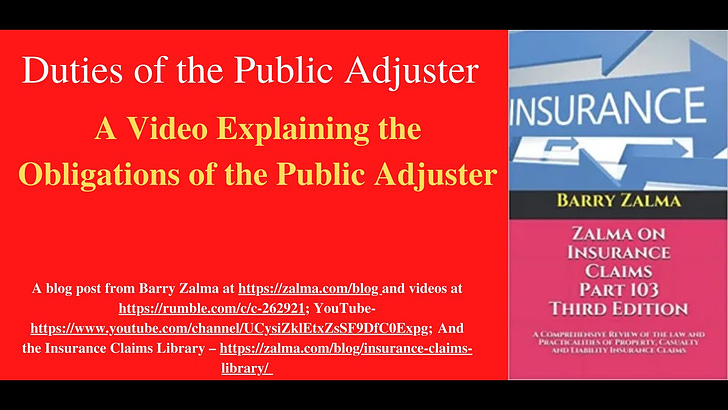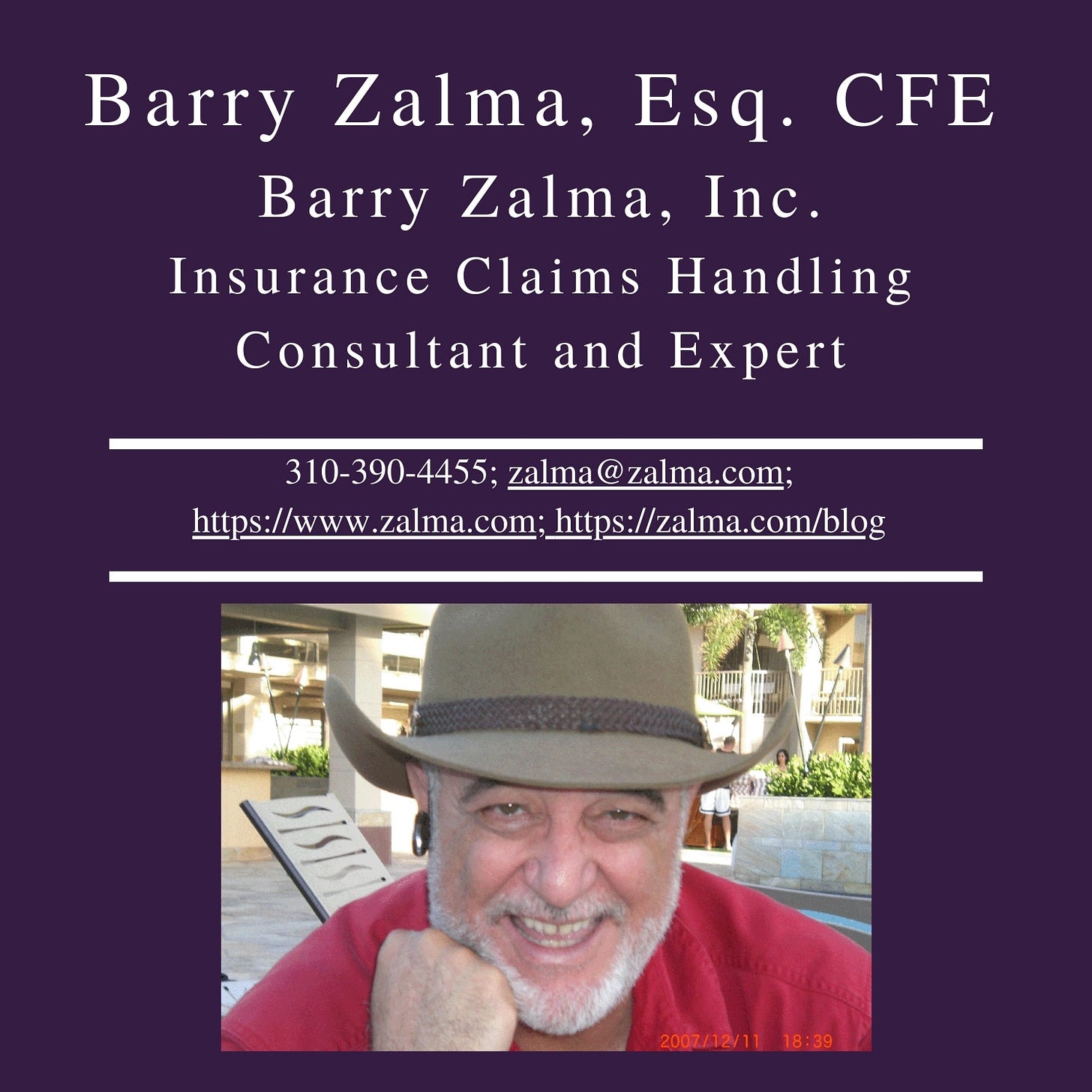A Video Explaining the Obligations of the Public Adjuster
Duties of the Public Adjuster
Read the full article at https://www.linkedin.com/pulse/duties-public-adjuster-barry-zalma-esq-cfe and see the full video at
and at https://rumble.com/vnwgk8-duties-of-the-public-adjuster.html and at https://zalma.com/blog plus more than 3900 posts.
Most policyholders do not have the in-house capability to investigate, evaluate, and negotiate significant property insurance losses. While some losses, such as a small fire loss requiring only minor repairs, may be dealt with easily, others, which involve more complex damages and different potential causes of loss, are much harder to assess. Resolving them may require expertise in understanding the scope of coverage provided by the applicable property insurance policy, scientific or other specialized background to determine the cause of a specific loss, the ability to determine the cost to repair or replace the damaged property, and the calculation of the amount of a time element (business interruption) loss.In such cases, the policyholder may wish to engage a public insurance adjuster (PA). PA’s are licensed by almost every state and their contract forms must be approved by the state.
All PAs claim to be experts on property loss adjustment. Most are. They represent only policyholders in fulfilling the duty to prepare, file, and adjust insurance claims. The PA should handle every detail of the claim, working closely with the policyholder and the insurer to obtain a prompt and reasonable settlement.
‘PAs invariably charge a contingency fee. When seeking an assignment, the PA will present the contingency fee to the insured as a fait accompli. Every person seeking the service of a PA must be aware that the PA’s fee is negotiable.
The insured should negotiate with the various representatives of PA firms who flock to fire and other loss sites, try to obtain the lowest contingency as possible. Negotiating with a PA is much like negotiating to buy a vase at an estate sale, one never pays the asking price. If there are multiple representatives from PA firms seeking to provide service it is appropriate to play them against each other to obtain a fair contingency since whatever the PA takes will be funds not available to repair the property.
For a major loss, more than one PA will arrive at the site seeking a contract. Rates can be negotiated from a low of 3% to a high of 40%, although the average charge for a run-of-the-mill loss is 10% to 15%. When considering a PA, the insured must take into account the skill, experience and reputation of the firm. The insured must also understand the fact that even if the insurer pays the full amount of the loss, the cost of the adjuster’s fee may not leave enough funds to fully repair the damaged structure. If the insured is a busy professional his or her time may be more valuable to the family than the fee paid to the PA who will take on the arduous task of putting together a complete proof of loss.
The public adjuster contract is technically an assignment of a portion of policy proceeds due to the policyholder from the insurer. To protect the ability to be paid the assignment gives the PA ownership of a percentage of any claims payments.
Upon being retained, the professional PA will often do nothing until the three-day cancellation provision most states require be in every PA contract. Then, whether immediately or after the expiration of the cancellation provision, the PA should:
Immediately inspect the loss site;
meet at the scene with the insurer’s adjuster to set a scope of loss;
analyze the damages;
assemble the necessary support for the claim presentation;
review the coverage to determine the portions of the loss which are covered;
assess the value of the loss; and
negotiate with the insurance company to reach the end result
© 2021 – Barry Zalma
Barry Zalma, Esq., CFE, now limits his practice to service as an insurance consultant specializing in insurance coverage, insurance claims handling, insurance bad faith and insurance fraud almost equally for insurers and policyholders.
He also serves as an arbitrator or mediator for insurance related disputes. He practiced law in California for more than 44 years as an insurance coverage and claims handling lawyer and more than 54 years in the insurance business.
Subscribe to Excellence in Claims Handling at https://barryzalma.substack.com/welcome.
He is available at http://www.zalma.com and zalma@zalma.com. Mr. Zalma is the first recipient of the first annual Claims Magazine/ACE Legend Award. Over the last 53 years Barry Zalma has dedicated his life to insurance, insurance claims and the need to defeat insurance fraud. He has created the following library of books and other materials to make it possible for insurers and their claims staff to become insurance claims professionals.
Go to training available at https://claimschool.com; articles at https://zalma.substack.com, the podcast Zalma On Insurance at https://anchor.fm/barry-zalma; Follow Mr. Zalma on Twitter at https://twitter.com/bzalma; Go to Barry Zalma videos at https://www.rumble.com/zalma ; Go to Barry Zalma on YouTube- https://www.youtube.com/channel/UCysiZklEtxZsSF9DfC0Expg; Go to the Insurance Claims Library – https://zalma.com/blog/insurance-claims-library/ The last two issues of ZIFL are available at https://zalma.com/zalmas-insurance-fraud-letter-2/ podcast now available at https://podcasts.apple.com/us/podcast/zalma-on-insurance/id1509583809?uo=4





